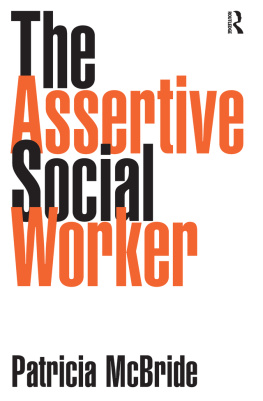Patricia McBride - The Assertive Social Worker
Here you can read online Patricia McBride - The Assertive Social Worker full text of the book (entire story) in english for free. Download pdf and epub, get meaning, cover and reviews about this ebook. year: 1998, publisher: Routledge, genre: Home and family. Description of the work, (preface) as well as reviews are available. Best literature library LitArk.com created for fans of good reading and offers a wide selection of genres:
Romance novel
Science fiction
Adventure
Detective
Science
History
Home and family
Prose
Art
Politics
Computer
Non-fiction
Religion
Business
Children
Humor
Choose a favorite category and find really read worthwhile books. Enjoy immersion in the world of imagination, feel the emotions of the characters or learn something new for yourself, make an fascinating discovery.
- Book:The Assertive Social Worker
- Author:
- Publisher:Routledge
- Genre:
- Year:1998
- Rating:3 / 5
- Favourites:Add to favourites
- Your mark:
- 60
- 1
- 2
- 3
- 4
- 5
The Assertive Social Worker: summary, description and annotation
We offer to read an annotation, description, summary or preface (depends on what the author of the book "The Assertive Social Worker" wrote himself). If you haven't found the necessary information about the book — write in the comments, we will try to find it.
The Assertive Social Worker — read online for free the complete book (whole text) full work
Below is the text of the book, divided by pages. System saving the place of the last page read, allows you to conveniently read the book "The Assertive Social Worker" online for free, without having to search again every time where you left off. Put a bookmark, and you can go to the page where you finished reading at any time.
Font size:
Interval:
Bookmark:

2 Park Square, Milton Park, Abingdon, Oxon OX14 4RN
711 Third Avenue, New York, NY 10017, USA
Product or corporate names may be trademarks or registered trademarks, and are used only for identification and explanation without intent to infringe.
McBride, Patricia
The assertive social worker
1. Social workers - Psychology 2. Assertiveness training
I. Title
361.3
McBride, Patricia, 1946- .
The assertive social worker: Patricia McBride.
p. cm.
Includes bibliographical references and index.
ISBN 1-85742-421-2 (pbk.)
1. Social workersPsychology. 2. Social workersAttitudes.
3. Social workers-In-service training.
4. Assertiveness (Psychology) 5. Assertiveness training. I. Title.
HV40.M445 1998
361.3'2'019-dc21 97-44525
CIP
| Figures |
| Tables |
- Step 1: Unconsciously incompetent - Before we start learning to drive we don't go around all day thinking, 'Oh dear, I don't know how to do a three point turn!' We just go about our daily business completely incompetent in terms of driving skills.
- Step 2: Consciously incompetent - Now we start driving lessons. Suddenly it is painfully clear what we don't know. The driving instructor tells us to turn left at the top of the hill. Panic! So many things to remember. Will we ever learn to indicate, look in the mirror, check over our shoulder and change gear all at once? This is a very uncomfortable stage in the learning process.
- Step 3: Consciously competent - We're getting the hang of this driving business now. The driving instructor tells us to turn left at the top of the hill and we calmly talk ourselves through the process, 'Indicate, look in the mirror, check over shoulder, change gear.' We can do it but we still have to think about it.
- Step 4: Unconsciously competent - We arrive at work completely unaware of the journey, our thoughts having been miles away.
- a case review where your views differ from the majority of the meeting
- being questioned in court by an aggressive barrister
- a client suddenly shouting and shaking a fist at you
- a colleague failing to undertake their share of the work
- a boss giving inadequate supervision
- an elderly, confused person smearing faeces for the third time in a day
Font size:
Interval:
Bookmark:
Similar books «The Assertive Social Worker»
Look at similar books to The Assertive Social Worker. We have selected literature similar in name and meaning in the hope of providing readers with more options to find new, interesting, not yet read works.
Discussion, reviews of the book The Assertive Social Worker and just readers' own opinions. Leave your comments, write what you think about the work, its meaning or the main characters. Specify what exactly you liked and what you didn't like, and why you think so.











